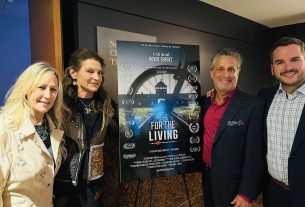Millions of nurses around the world will celebrate International Nurses Day on May 12 to mark the anniversary of the birth of Florence Nightingale, who has been credited with being the founder of modern nursing. The British nurse, statistician and social reformer, who lived from 1820 to 1910, is best known for caring for thousands of wounded and sick British troops in Turkey during the Crimean War between Great Britain and Russia.
The International Council of Nurses (ICN) has celebrated International Nurses Day since 1965. Focusing on a “brighter future of nursing” and how the profession can help improve global health for all will be at the center of this year’s Nurses Day around the globe. The ICN, which represents millions of nurses worldwide, said that the theme sets out what the federation hopes for nursing in years to come.
The profession has, of course, changed greatly since Nightingale’s time, from when nurses were busy changing bandages and bedpans but having no academic training or advanced technology. A special event was held in Israel at the President’s Residence to mark the day.
According to Health Ministry statistics, there are some 84,000 female and male nurses in Israel up to the age of 67, with the ratio of only 6.7 nurses to 1,000 people. This is an increase compared to previous years, but there are still not enough. Today, there are about 12,000 nursing students in all tracks throughout the country.
There are 14 different areas of nursing expertise in Israel. They include work in community health clinics, premature baby units, obstetrics, geriatrics, diabetes, surgery, rehabilitation, diabetes and wound healing, with four more under development. In addition, there are 26 clinical areas, such as intensive care, urgent medicine, operating rooms and midwives.
A five-year ministry plan called “7, 60, 6” is aimed at increasing the ratio of nurses to 7 per 1,000 residents; raising the proportion of nursing graduates of advanced study at a bachelor’s degree level; and developing clinical expertise at the graduate degree level.
In addition, the ministry said it is working to expand the independence of nurses – a step that could lead to the promotion of the quality of treatment and the availability of service, achieving improved treatment and research-based therapeutics.
Health Minister Moshe Arbel commented that “our health system is one of the best in the world, thanks to the medical staff who work round the clock for the benefit of patients. The nurses are not just the beating heart; they represent uncompromising professionalism and are working to maintain public health out of an amazing sense of mission and love. “But I am aware of the heavy load and pressure they have to cope with in their daily work routine.”
Ministry Director-General Moshe Bar Siman Tov added that “Nurses are major partners in dealing with the challenges of the health system and are a significant backbone for strengthening the health system. We are working to advance their professional and management abilities.”
In 2020, the WHO recognized Israel’s Nursing Administration as “an international leadership and cooperation center that provides advice abroad and workshops and hosts overseas delegations that come to study here.”
The ministry’s Nursing Administration director, Dr. Shoshy Goldberg, said that Israel’s nurses are the main resource for promoting the health of citizens and an anchor of professionalism who provide meaning for the lives of many. “The profession breaks down the glass ceiling in many areas, thanks to initiative and leading significant change processes and innovative solutions to our health system.
President’s Residence ceremony for International Nurses Day
At the President’s Residence ceremony to mark International Nurses Day, Siham Shalibi Elhausa, a Bedouin nurse at Segev Shalom, received an award for excellence and dedicated work and empathy towards her patients. Thirty-five years old, married and the mother of three, she graduated with a bachelor’s degree from Ben-Gurion University in the Negev (BGU) in Beersheba and immediately began working for Meuhedet Healthcare Services. After a short period of time, she was appointed nursing director at Segev Shalom, which today has 10,000 members in the area.
A major part of her work is that she is a pregnancy supervision nurse, in which she is exposed to difficulties that are often due to the distance from the clinic, language gaps and the lack of awareness of vital genetic testing. “My parents supported me from the moment I decided to study nursing, and my father was a personal example for me. As a human being, he never gave up on the dream that I will succeed and the dream to improve our population. I knew that I had to work to change the health perception in the Bedouin population and to reduce gaps. This is a population with a unique culture and traditional lifestyle who suffer from high infant mortality alongside high birth rates and a lack of regular checkups, relatively low life expectancy, genetic diseases and more.”
She recalled that a father came to her who feared that his daughter would marry her first cousin. After the daughter did a test, I managed to persuade the future groom to be tested, and we saw that there was no problem. “I am exposed to the problem many among Bedouin society because of the large distance from the clinic and language gaps.”
Herzog also presented an award to Samil Yousef, a Maccabi Health Services nurse who saved the life of a month-old toddler. Yousef, who works for the health fund’s online service, received a routine call from a mother who made her suspicious of a problem. She sensed the mother’s distress even when nothing clear was said and realized that this was a case of domestic violence. She reported the information to a multi-professional team, a welfare team who sent help and saved the baby’s life.
ICN president Dr. Pamela Cipriano said the profession “needs to learn from the lessons of the coronavirus pandemic” and translate these into actions for the future “that ensure nurses are protected, respected and valued.”
She described how, through the release of several important publications, such as the State of the World’s Nursing Report, the ICN and other organizations have “shown the evidence for change” and called for investment in nursing. She added that “it is now time to look to the future and demonstrate what these investments will mean for nursing and healthcare.
The ICN head noted the 2023 theme will “capture key actions” that the organization believes are essential to address both the profession and health systems and that are “mutually beneficial and reinforcing, adding: “Our future depends on every nurse, every voice, not only to be on the front lines of care, but also be on the front lines of change.”




